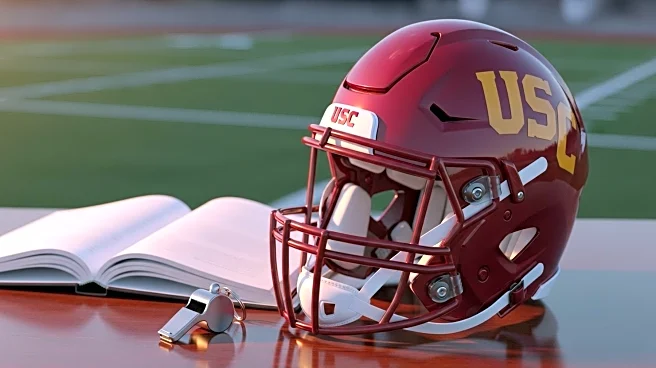What's Happening?
The USC Trojans are preparing for their upcoming game against the Illinois Fighting Illini, with significant changes made to their strategy following a challenging first year in the Big Ten. Under the leadership of Lincoln Riley, the Trojans finished last season with a 7-6 overall record and a 4-5 record in the Big Ten. To address these issues, USC's athletic department hired Notre Dame general manager Chad Bowden, who has been instrumental in improving the team's recruitment strategy, resulting in the No. 1 ranked recruiting class for 2026. Additionally, USC retained defensive coordinator D'Anton Lynn despite interest from Penn State, and made changes to their strength and conditioning staff by bringing in Trumain Carroll from Kansas State. These moves aim to enhance team discipline and performance, particularly in Big Ten play.
Why It's Important?
The strategic changes implemented by USC are crucial for their competitiveness in the Big Ten, a conference known for its rigorous competition. By focusing on local talent and improving their recruitment strategy, USC is positioning itself to build a stronger team foundation. The retention of key personnel like D'Anton Lynn and the hiring of Trumain Carroll are expected to bolster the team's defense and overall discipline, addressing previous weaknesses. These efforts are significant as they could lead to improved performance in future seasons, potentially elevating USC's standing in the Big Ten and enhancing their prospects in national competitions.
What's Next?
USC will face the Illinois Fighting Illini in their next game, providing an opportunity to test the effectiveness of their revamped strategy. The outcome of this game could offer insights into the team's progress and readiness for the remainder of the season. As USC continues to integrate new recruits and adjust to personnel changes, their performance in upcoming games will be closely watched by stakeholders and fans. Success in these matches could validate the strategic changes and boost morale within the team, while also influencing future recruitment and training decisions.
Beyond the Headlines
The changes at USC reflect broader trends in college football, where teams increasingly focus on strategic recruitment and personnel management to gain competitive advantages. The emphasis on local talent and improved discipline highlights a shift towards building sustainable team dynamics. These developments may influence other programs within the Big Ten and beyond, as they seek to emulate successful strategies. Additionally, the focus on team discipline and accountability could have long-term benefits for player development and team cohesion.









